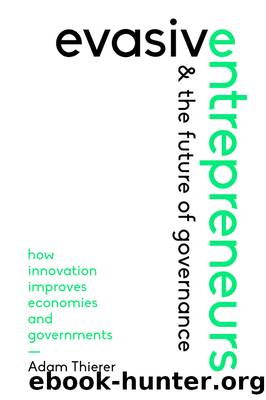Evasive Entrepreneurs and the Future of Governance by Adam Thierer

Author:Adam Thierer
Language: eng
Format: epub
ISBN: 9781948647779
Publisher: Cato Institute
Published: 2020-04-23T00:00:00+00:00
Making Permissionless Innovation and Responsible Innovation Compatible
Although humanist critiques of technology often go much too far, innovationâs defenders should take seriously calls by critics to incorporate other values or rights into the process of technological development and governance. Concerns about the safety, security, and privacy-related implications of many emerging technologies are particularly notable in this regard because those issues pervade almost every emerging technology sector today.
Those concerns have led to a growing intellectual movement known as âresponsible research and innovationâ (RRI). Although this movement is more widespread in Europe, it is growing in the United States, but sometimes under the auspices of âtechnology ethicsâ or other labels.46 In the United States, the term âupstream governanceâ is often used to refer to largely the same thing.47 A great deal of work by STS scholars today revolves around these themes of âresponsible innovation,â âethical innovation,â and âupstream governance.â48 Definitions are still evolving, but a 2011 article by René von Schomberg, a leader in the RRI movement and the Director General for Research at the European Commission, defined RRI as follows:
A transparent, interactive process by which societal actors and innovators become mutually responsive to each other with a view to the (ethical) acceptability, sustainability and societal desirability of the innovation process and its marketable products (in order to allow a proper embedding of scientific and technological advances in our society).49
Other scholars define RRI more simply, saying that it comes down to âtaking care of the future through collective stewardship of science and innovation in the present.â50 Practically speaking, this definition means anticipating the potential adverse consequences associated with technological change and seeking to somehow mitigate them through some form of upstream governance.
In a sense, RRI is just an extension of corporate social responsibility (CSR), a widely discussed but quite amorphous concept in the United States and abroad. It is not really clear what CSR means in many contexts, or that it even works that well in practice.51 Regardless, CSR has become a major part of modern business practices and decisionmaking. RRI builds on CSR, but RRI is more squarely focused on addressing the potential risks associated with specific technologies or technological processes. In 1970, the Nobel Prizeâwinning economist Milton Friedman observed that discussions about CSR âare notable for their analytical looseness and lack of rigor.â52 His statement is still somewhat true for CSR today, and it is especially true for RRI. Both concepts remain open to differing interpretations and incorporate many distinct values that vary by context. At root, however, what RRI and CSR have in common is the belief that, whatever those responsible values are, they should be baked in early during product decisionmaking and design.
At first blush, it may seem as if permissionless and responsible innovation are fundamentally at odds. To the contrary, RRI can very much be part of a policy regime that adopts permissionless innovation as its general tech policy default. These concepts can coexist so long as policymakers and RRI advocates are willing to think more broadly about what the term âgovernanceâ means as applied to technological processes.
Download
This site does not store any files on its server. We only index and link to content provided by other sites. Please contact the content providers to delete copyright contents if any and email us, we'll remove relevant links or contents immediately.
The Box by Marc Levinson(1590)
The Innovators by Walter Isaacson(1583)
The Innovators: How a Group of Hackers, Geniuses, and Geeks Created the Digital Revolution by Walter Isaacson(1500)
The Everything Store: Jeff Bezos and the Age of Amazon by Stone Brad(1407)
The Path Between the Seas by David McCullough(1179)
The Victorian Internet by Tom Standage(1073)
The Art of Innovation by Tom Kelley(979)
A History of the World in 12 Maps by Jerry Brotton(869)
Thunderstruck by Erik Larson(849)
In the Garden of Beasts by Erik Larson(823)
The Intel Trinity: How Robert Noyce, Gordon Moore, and Andy Grove Built the World's Most Important Company by Malone Michael S(708)
The Grand Strategy of the Roman Empire by Edward N. Luttwak(686)
Cyberspies by Gordon Corera(643)
The Innovators: How a Group of Inventors, Hackers, Geniuses and Geeks Created the Digital Revolution by Walter Isaacson(635)
The Substance of Civilization: Materials and Human History from the Stone Age to the Age of Silicon by Stephen L. Sass(570)
A Million Years in a Day by Greg Jenner(561)
How We Got to Now: Six Innovations That Made the Modern World by Steven Johnson(553)
05 Marine by Tom Clancy(551)
01 Submarine by Tom Clancy(533)
